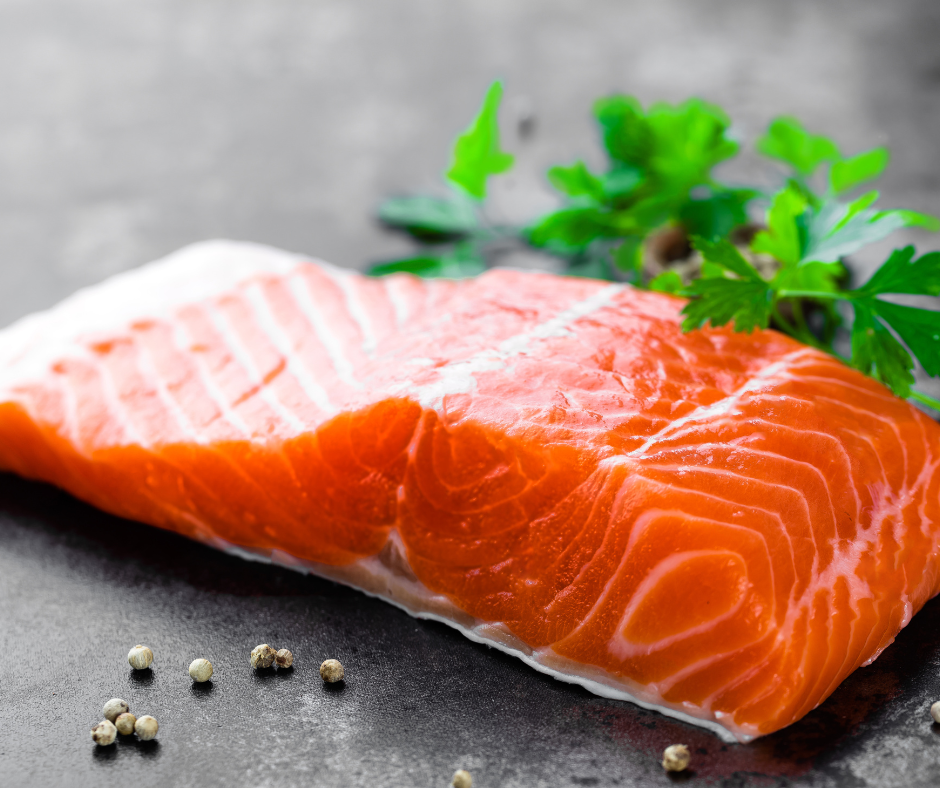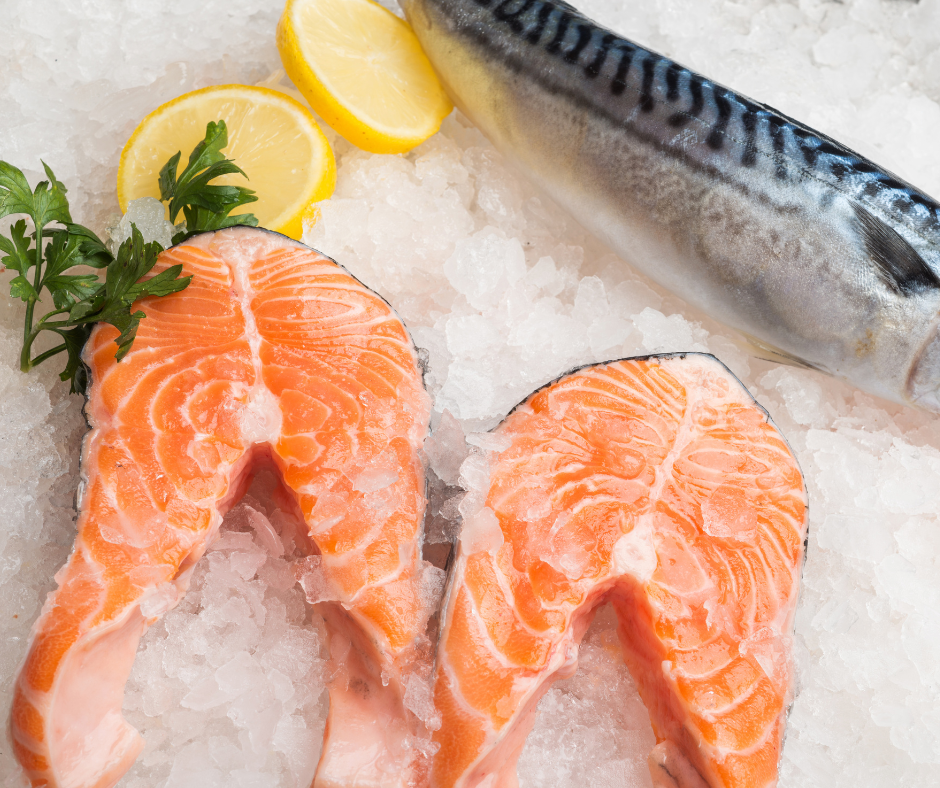Introduction
Salmon is a popular and nutritious seafood choice for many people. However, if not stored properly, salmon can quickly spoil, losing flavor and quality. To ensure you can enjoy delicious salmon dishes even during the off-season or when you have excess fresh salmon, it is crucial to understand ‘How Long Does Salmon Last in the Fridge?‘ and follow proper storage techniques.
Importance Of Proper Storage For Maintaining Salmon Freshness
Proper storage is essential for maintaining the freshness of salmon. Salmon stored at the right temperature and handled correctly can last several days in the fridge. By keeping the fish fresh, you can enjoy its delicate flavor and reap its nutritional benefits.
Overview Of Salmon Storage Tips
Here are some tips for storing fresh salmon in the fridge:
- Purchase fresh salmon: The shelf life in the fridge depends on its freshness when purchased. Look for salmon with bright, clear eyes, firm flesh, and a mild odor. Avoid fish with dull eyes, discolored flesh, or a strong fishy smell.
- Proper packaging: To prevent contamination and maintain freshness, it is essential to properly package salmon before storing it in the fridge. Place the fish in an airtight container or wrap it tightly in plastic wrap to prevent exposure to air.
- Store at the right temperature: Salmon should be stored at a temperature between 32°F and 38°F (0°C and three °C). Ensure your fridge is set to the correct temperature, and avoid storing the fish in the door, as the temperature fluctuates more there.
- Separate from other foods: To avoid cross-contamination, store salmon separately from other foods in the fridge. If possible, keep it in the coldest part of the fridge, such as the bottom shelf.
- Use it within 4-5 days: Fresh salmon can last 4-5 days in the fridge with proper storage and handling. Consuming it within this time frame is best to ensure optimal freshness and quality.
By following these storage tips, you can extend the shelf life of salmon in the fridge and enjoy it at its best. Whether you have a beautiful piece of salmon you want to savor or leftovers from a delicious meal, proper storage practices will help you make the most of this delectable seafood.

How Long Does Salmon Last in the Fridge?
Salmon, being a delicate seafood, requires proper storage to maintain its freshness and quality. When stored correctly in the refrigerator, salmon can last for a certain duration before it spoils. Here, we will explore the maximum duration of salmon storage in the fridge and discuss the signs of spoilage to look out for.
The Maximum Duration Of Salmon Storage In The Refrigerator
So, How Long Does Salmon Last in the Fridge? Salmon can be safely stored in the refrigerator for 2 to 4 days, depending on whether it has been cooked. If you have leftover cooked salmon, it can last about 3 to 5 days when stored correctly. On the other hand, fresh raw salmon can last for approximately 2 to 3 days in the fridge before losing its flavor and quality.
To ensure the longest possible shelf life for your salmon in the fridge, it is crucial to follow proper storage techniques. Place the salmon in the coldest part of the refrigerator, such as the bottom shelf or a dedicated drawer, as these areas maintain a consistent and cold temperature. It is also important to store the salmon separately from other foods to avoid cross-contamination and to preserve its freshness.
Signs Of Spoilage To Look Out For
When checking if your salmon is still fresh, there are certain signs of spoilage to be aware of. These signs include a strong fishy odor, a slimy texture, or a discolored appearance. If your salmon exhibits any of these signs, it is best to discard it as it may pose a health risk if consumed.
Additionally, any noticeable mold growth on the salmon clearly indicates spoilage and should not be consumed. When in doubt, it is always better to err on the side of caution and discard any questionable salmon.
By following these guidelines and being mindful of the recommended storage duration and signs of spoilage, you can ensure that your salmon remains fresh and safe to consume. Remember, proper storage techniques are essential in maintaining the taste, texture, and overall quality of your salmon in the fridge. So, confidently enjoy your salmon dishes, knowing you are savoring the best of this delicious seafood!
Salmon Storage Tips
Proper Handling And Storage Techniques
Ensuring the longevity of your salmon in the fridge starts with proper handling and storage techniques. When you bring fresh salmon home, make sure to handle it with care. Avoid letting it sit at room temperature for too long, as bacteria can multiply rapidly in the seafood’s delicate flesh.
Once you’re ready to store your salmon, keeping it at the right temperature is crucial. The ideal temperature for salmon storage is between 32°F and 38°F (0°C and three °C). This ensures that the fish stays fresh and maintains its quality. To achieve this, place the salmon in the coldest part of the refrigerator, such as the bottom shelf or a dedicated drawer.
It’s also essential to store the salmon separately from other foods to prevent cross-contamination. You can place the fish in a sealed container or wrap it tightly in plastic to keep it fresh and protect it from the odors and flavors of other ingredients in the fridge.
Importance Of Rinsing And Drying The Salmon
Before storing raw salmon in the fridge, it’s advisable to rinse it under cold water to remove any surface bacteria. After rinsing, pat the fish dry with paper towels. Moisture can accelerate spoilage, so ensure the salmon is dry before storage.
Drying the salmon also helps to maintain its texture and prevent it from becoming mushy or slimy. Once the fish is dry, you can transfer it to a container or wrap it tightly in plastic wrap to keep it fresh and protected.
In addition to rinsing and drying, it’s also essential to handle cooked salmon with care. If you have leftover cooked salmon, allow it to cool to room temperature before refrigerating. Placing hot or warm food directly into the refrigerator can raise the temperature, potentially leading to bacterial growth.
By following these proper handling and storage techniques, you can prolong the freshness of your salmon in the fridge and enjoy it for 2 to 4 days. Remember to use your judgment and assess the fish for any signs of spoilage before consumption.
Proper storage and handling practices are essential for maintaining the quality of salmon in the fridge. By adhering to these tips, you can confidently savor delicious salmon dishes without compromising taste or safety.

How Long Does Salmon Last In The Freezer?
Freezing Salmon To Extend Its Shelf Life
To prolong the shelf life of salmon, freezing is an excellent option. By upending the traditional supply chain, BluGlacier processes its salmon the same day it’s caught, flash-freezing them at their peak freshness with minimal handling to preserve the quality. Freezing salmon allows you to enjoy it for longer and be available anytime.
When freezing salmon, it is crucial to follow the proper steps to ensure its quality and taste remain intact. Firstly, make sure the salmon is properly stored. This means placing it in a sealed container or wrapping it tightly in plastic before putting it in the freezer. This will protect it from freezer burn and potential exposure to odors.
Recommended Duration For Frozen Salmon Storage
When frozen and stored correctly, salmon can remain good for up to three months or even longer. However, it is important to note that the freezer time shown is for best quality only. While the salmon may remain safe beyond that time, its quality may start to deteriorate.
Consuming the frozen salmon within the recommended duration is advisable for the best taste and texture. Frozen salmon can last about 9-12 months in the freezer, but consuming it within three months is recommended to ensure optimal freshness.
It’s important to note that while freezing salmon can extend its shelf life, eating it fresh whenever possible is always recommended. By eating the salmon fresh, you can enjoy the full flavors and textures that make it a sought-after seafood delicacy.
In conclusion, freezing salmon can allow you to extend its shelf life and enjoy it at your convenience. By following proper storage techniques and consuming it within the recommended duration, you can ensure the salmon remains of the highest quality. Whether you enjoy it fresh or frozen, salmon is a healthy and delicious seafood superstar that will satisfy your taste buds. So, go ahead, store it properly, and savor the flavors of perfectly preserved salmon. Bon appétit!
Package And Labeling
Ensuring Airtight Packaging For Freezer Storage
To properly store salmon in the fridge, ensuring airtight packaging for freezer storage is crucial. This means that the salmon needs to be wrapped tightly to prevent air and moisture from coming into contact with the fish. The best way is to use freezer bags or airtight containers specifically designed for freezing food.
When packaging the salmon, it is recommended to double-wrap it for added protection. Consider wrapping the salmon in an additional layer of aluminum foil or placing it in a sealed container to provide extra insulation and protection from freezer burn. This will help maintain the quality and freshness of the salmon during its time in the fridge.
Importance Of Labeling The Package With The Freezing Date
Labeling the package with the freezing date is essential for better organization and tracking how long the salmon has been in the fridge. Salmon can be stored in the fridge for up to three months, so it is important to know when it was frozen to ensure it is consumed within the recommended time frame.
Labeling the package with the freezing date allows you to easily identify the oldest salmon and ensure it is first consumed. This helps prevent any wastage by ensuring the salmon is used before its quality deteriorates.
Labeling the package with the freezing date also helps maintain your fridge’s overall organization. It allows you to easily locate and keep track of your frozen salmon stock, ensuring that it is properly rotated and consumed promptly.
In conclusion, proper packaging and labeling are crucial for storing salmon in the fridge. Airtight packaging helps maintain the quality of the salmon by preventing air and moisture from affecting it. Labeling the package with the freezing date ensures better organization and helps consume the salmon within the recommended time frame. Following these storage tips, you can enjoy fresh and delicious salmon for an extended period.

Smell And Texture
Detecting Spoilage Through The Smell Of Salmon
One of the key signs that salmon has gone bad is its smell. Fresh salmon should not have a strong odor. However, if it smells sour, rancid, fishy, or like ammonia, it is likely spoiled and should be discarded. These unpleasant smells indicate that the salmon has undergone bacterial or chemical changes that make it unsafe to consume. Trusting your senses and relying on your sense of smell is important to determine if the salmon is still fresh.
Evaluating The Texture And Firmness Of Fresh Salmon
Another way to determine the freshness of salmon is by assessing its texture and firmness. Fresh salmon should have a somewhat springy and firm texture. When you touch the fish, it should bounce back slightly and leave a minimal imprint. If the salmon feels mushy or leaves a deep impression, it is likely past its prime and may have started to spoil.
Furthermore, it should have a naturally flaky texture when you fork into cooked salmon. However, leftover salmon that has gone bad will lose its flakiness and develop a slimy consistency. If you notice a slimy texture on the salmon, it indicates that it has spoiled and should not be consumed.
By paying attention to the smell and texture of the salmon, you can easily determine if it is still fresh and safe to eat. If you notice any off-putting smells or a slimy texture, it is best to err on caution and discard the salmon to avoid any potential foodborne illnesses.
To prevent salmon from spoiling quickly, proper storage is essential. Salmon should be stored in the refrigerator at or below 40 degrees Fahrenheit. Using airtight packaging, such as freezer bags or containers, is recommended to prevent air and moisture from contacting the fish. Additionally, labeling the package with the freezing date can help you track how long the salmon has been in the fridge and ensure it is consumed within the recommended time frame.
By following these storage tips and being mindful of the smell and texture of the salmon, you can enjoy fresh and delicious salmon for an extended period. It is always better to be safe than sorry when determining the freshness of salmon, as consuming spoiled fish can lead to food poisoning and other health issues.
Conclusion
Now you should know the answer to ‘How Long Does Salmon Last in the Fridge?’. Proper storage techniques are crucial for maximizing the shelf life and maintaining the freshness of salmon in the fridge. Following these tips, you can enjoy delicious and nutritious salmon for an extended period. It is important to pay attention to the smell and texture of the salmon to determine if it is still fresh and safe to consume. Trusting your senses and erring on the side of caution is always recommended when determining the freshness of salmon.
Summary Of Salmon Storage Tips And Duration
When storing salmon in the fridge, consuming it within 4-5 days is ideal for optimal freshness. Proper storage and handling can help prolong the shelf life of the salmon. Here are some key tips to keep in mind:
- Properly store the salmon: Wrap the salmon tightly in plastic wrap or use airtight packaging such as freezer bags or containers to prevent air and moisture from coming into contact with the fish.
- Maintain a cold temperature: Store the salmon in the refrigerator at or below 40 degrees Fahrenheit.
- Label the package: It is recommended to label the package with the freezing date to keep track of how long the salmon has been in the fridge and ensure it is consumed within the recommended time frame.
Importance Of Following Proper Storage Techniques For Longer Freshness
Following proper storage techniques is essential for maintaining the quality and freshness of salmon. Storing the salmon at the correct temperature and using airtight packaging can prevent bacterial growth and spoilage. Consuming spoiled salmon can lead to foodborne illnesses and other health issues. Therefore, it is crucial to be mindful of the storage techniques and pay attention to the smell and texture of the salmon to ensure it is still fresh and safe to eat.
By implementing these storage tips and being vigilant about the freshness of salmon, you can enjoy this delectable seafood for a longer period. Proper storage practices will not only help preserve the taste and texture of the salmon but also ensure that it remains safe for consumption. Remember, freshness is key to enjoying the full benefits of salmon.
FAQ: How Long Does Salmon Last in the Fridge? Salmon Storage Tips
Q: How Long Does Salmon Last in the Fridge?
A: Salmon can last about 4-5 days in the fridge with proper storage and handling.
Q: How should I store salmon in the fridge?
A: Here are some tips for properly storing salmon in the fridge:
- Place the salmon in a tightly sealed container or wrap it tightly in plastic to prevent air from getting in.
- Make sure to refrigerate fresh salmon as soon as possible after purchase.
- The ideal temperature for storing salmon in the fridge is between 32°F and 38°F (0°C to 3°C).
- If you have leftovers, store them in an airtight container and consume them within two days.
Q: Can I store frozen salmon in the fridge?
A: Yes, you can store frozen salmon in the fridge. When thawing frozen salmon, it is best to do it slowly in the refrigerator to maintain its quality. Once thawed, the same storage rules apply as with fresh salmon.
Q: How long does frozen salmon last?
A: Frozen salmon can last several months if stored properly in the freezer. Cover it tightly in plastic or foil and place it in an airtight container or freezer bag to prevent freezer burn.
Q: What are the signs that salmon has gone bad?
A: When salmon goes bad, it may have a foul smell, a slimy texture, or show signs of discoloration. If you notice any of these signs, it is best to discard the salmon to avoid any risk of foodborne illness.
Proper storage and handling are essential for keeping salmon fresh and safe to eat. By following these tips, you can enjoy your salmon without worry and ensure its quality for longer.
Graham Bartlett, owner at Taco and Piña Mexican food, is all about bringing the authentic flavors of Mexico to your plate. With Graham Bartlett, you can tantalize your taste buds with mouthwatering tacos and delicious piña coladas, all in one place. Stay connected and never miss a beat as Graham Bartlett takes you on a culinary journey through vibrant Mexican cuisine. Join the community and discover the perfect blend of flavor, culture, and passion that Graham Bartlett brings to the table. Experience the essence of Mexico, one bite at a time, with Graham Bartlett.
